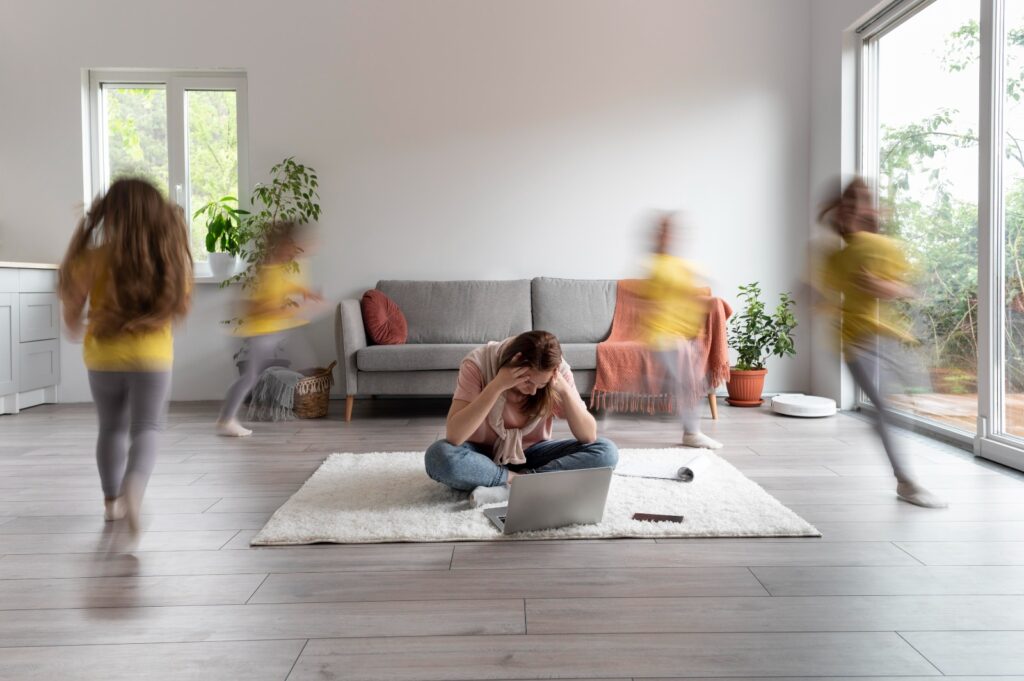Feeling overwhelmed by mess?
How Clutter Affects Mental Health and What You Can Do About It
In the hustle of daily life—especially in Indian households where space is often shared across generations—clutter creeps in quietly. But its impact isn’t just physical; it’s deeply emotional too.
From constant stress to poor sleep, clutter takes a toll on your mental well-being in ways many don’t realize. Let’s take a closer look at how clutter affects your mind—and what you can do to bring back clarity and calm into your life.

The Hidden Mental Load of Clutter
A cluttered space isn’t just disorganized—it speaks to the brain like a to-do list that never ends. Here’s how clutter can subtly but significantly affect your emotional and mental health:
1. Triggers Stress and Anxiety
Constant visual reminders of tasks left undone can overload your senses. The result? Heightened stress levels and the sense that you’re always “on.” In smaller urban homes, where living, working, and sleeping areas blend, this can feel magnified.
2. Affects Focus and Productivity
A cluttered space can drain your mental energy. Whether you’re working from home or managing daily chores, clutter competes for your attention and reduces your ability to concentrate.
3. Leads to Guilt and Shame
Many people feel embarrassed by their clutter—especially when unannounced guests arrive. This can slowly erode self-esteem and discourage social interactions.
4. Disrupts Sleep Quality
A messy bedroom or overflowing bedside table sends the wrong signals to your brain. It’s harder to relax, which in turn affects your ability to fall—and stay—asleep.
5. Creates Decision Fatigue
Clutter forces your brain to constantly make choices: “Where do I put this?” or “Do I need to keep this?” Over time, this leads to decision fatigue and procrastination.
What You Can Do: Simple Solutions to Lighten the Mental Load
The good news? You don’t need to declutter your whole home in one day. Here are realistic, stress-free strategies to reduce clutter and support your mental health:
✅ Start Small with the 10-Minute Rule
Pick one small area—a single drawer, shelf, or tabletop. Set a timer for 10 minutes and do what you can. Small wins can build long-lasting habits.
✅ Create a Donation Station
Keep a designated box for items to donate or give away. Letting go becomes easier when you know it will help someone else.
✅ Use the One-In-One-Out Rule
Bought a new kurta or kitchen utensil? Let go of an old or unused one. This prevents new clutter from piling up.
✅ Involve the Family
Organizing is not a solo job. Assign age-appropriate tasks to each family member and make it a collaborative weekend activity.
✅ Don’t Ignore Digital Clutter
Clean your inbox, delete unused apps, and organize photos on your phone. Even digital tidying can ease mental clutter.
✅ Use Zoning to Define Spaces
Assign zones to each room—a work zone, a play corner, a relaxation nook. It helps organize items and reduces confusion about where things belong.
The Mental Payoff: Why It’s Worth It
Decluttering isn’t just about appearances. It creates:
- 💡 More mental clarity
- 😌 Reduced stress levels
- 💤 Better sleep
- 🧠 Increased focus and motivation
- 💪 A sense of control and confidence
Final Thoughts: Clear Space, Clear Mind
In a culture where multitasking is a way of life and space is often limited, the emotional benefits of an organized home are immense. By taking even small steps, you can create a home that supports your mental well-being instead of draining it.
At The Clutter Cure, we believe that a decluttered space leads to a decluttered mind. Explore our blog for more realistic, sustainable organizing tips tailored for everyday Indian homes.
Working from home has become the new norm for many in India, a cluttered workspace can lead to distracted thinking, lower productivity, and increased stress.
Decluttering tips for professionals to enhance focus and productivity at home
